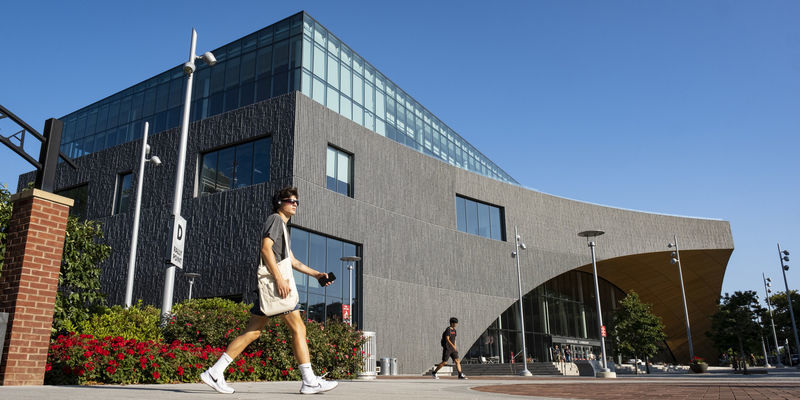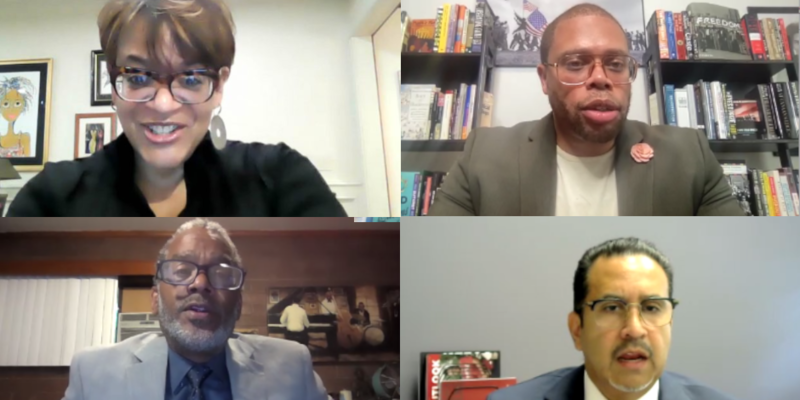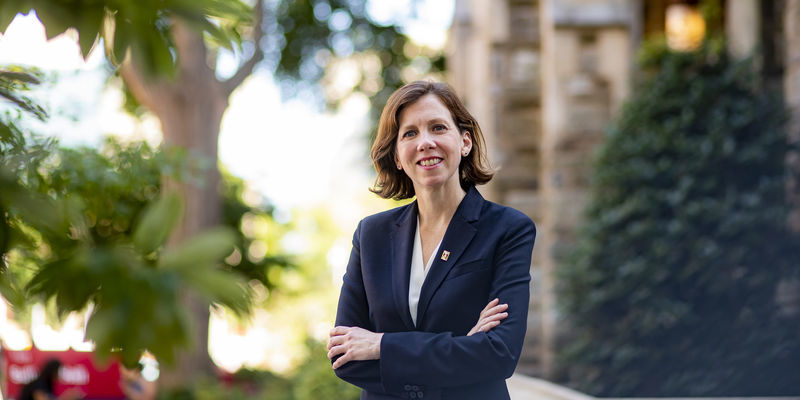A look at the Temple Law clinic that fights for immigrants
The Beasley School of Law’s Federal Appellate Litigation Clinic provides talented third-year law students to represent low-income individuals in federal appeals. With a success rate of 83%, the program gives its clients a fighting chance at receiving justice.
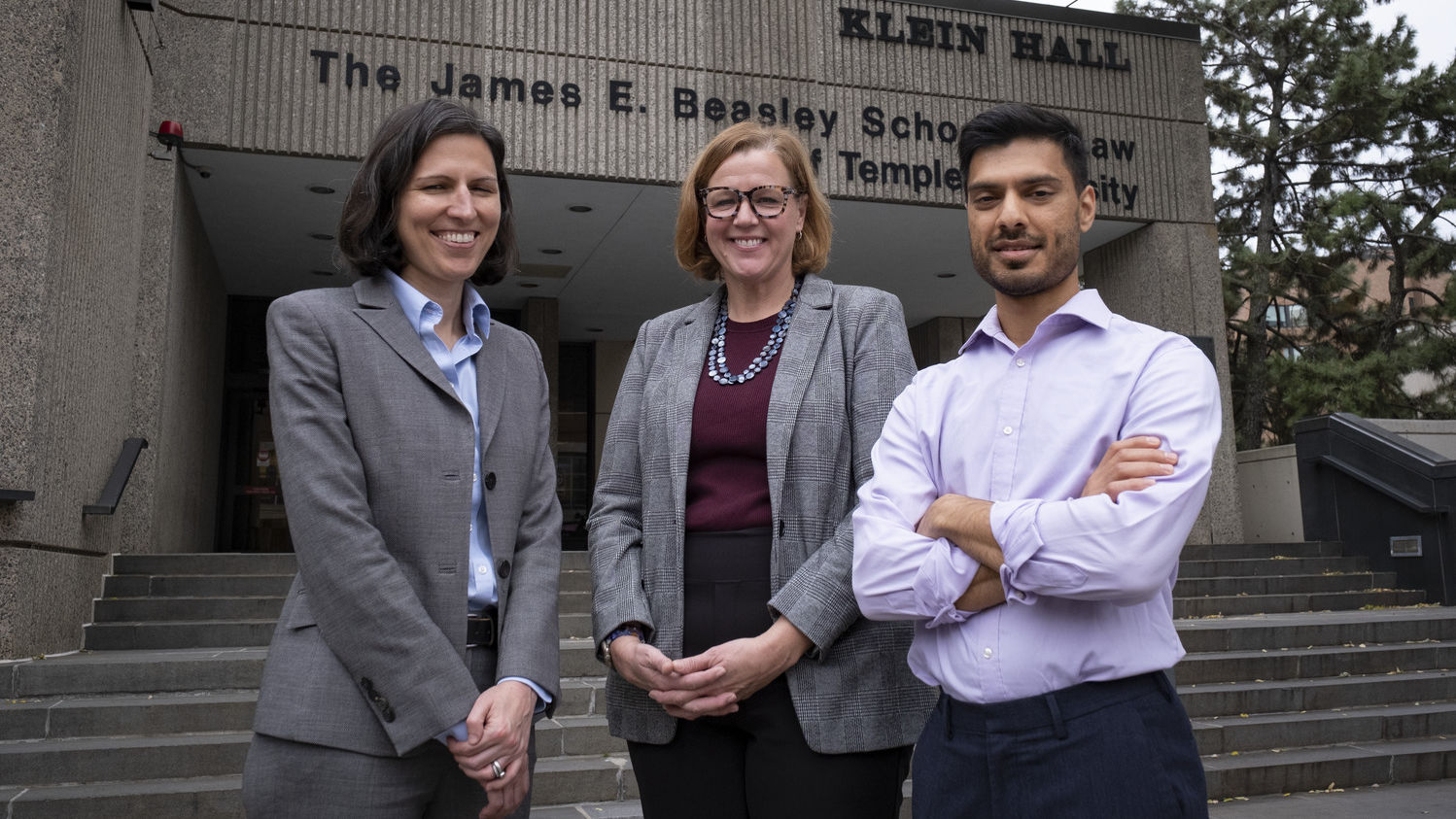
It’s 7 a.m. on the morning of May 26, 2021, and third-year law student Neilay Shah just finished his morning cup of coffee. In a few hours, Shah will appear before a panel of federal judges from the Third Circuit Court of Appeals, where he will challenge the decision to deport a man named Jay Wright to Trinidad and Tobago.
Shah and Wright have only known each other for about eight months, and they have never met face-to-face. They have communicated exclusively through phone calls to the Bergen County Jail, where Wright is being detained by U.S. Immigration and Customs Enforcement (ICE). Still, Shah is well-prepared to appeal a decision that would send Wright back to the country he fled when he was 11 years old. Shah is ready to fight for Wright’s freedom.
Throughout the 2020–2021 school year, Shah and a team of fellow third-year law students from the Beasley School of Law participated in the launch of the Federal Appellate Litigation Clinic. Beasley professors Mary Levy and Jules Epstein developed the clinic to provide legal representation free of charge to low-income clients.
The clinic most often takes on immigration cases, in which clients are appealing an order of deportation or civil rights appeals. The cases are argued in the Third Circuit Court of Appeals, a federal court one step below the Supreme Court, which makes the experience incredibly impactful for the law students and their careers.
“It’s the pinnacle of any litigator’s career to practice in a federal appellate court,” Levy said, adding that practicing in a federal court is rare for lawyers in general, let alone law students.
“It’s a tremendous amount of work, but it’s work at a high level,” she continued. “By the time these students go into practice, they’ve already handled a really sophisticated, complicated matter, where the stakes are high for an entire year.”
The clinic’s work also has massive implications for its clients. The Third Circuit is oftentimes the last court where a client can appeal their case and hope to receive justice. “A lot of the clients see their legal case as a life-or-death issue, especially in the immigration appeals,” said Jessica Rickabaugh, a lawyer at the Philadelphia-based Tucker Law Group. Rickabaugh partners with the clinic and helps mentor the students. “[The clients] don’t want to go back to wherever they came from, because they believe that their life may be in jeopardy.”
By the time a client gets involved with the clinic, they have been representing themselves without a lawyer throughout most, if not all, of their legal proceedings. Involving the clinic and its talented law students in the final appeal is crucial to a client’s chances of success.
“I looked at the data, and the statistics were pretty stark that the likelihood of success plummets when a client represents themselves in an appeal,” Levy said. People involved in immigration cases experience success rates that are two to three times higher when they are represented by a lawyer, versus those who are unrepresented.
“Our mission in starting the clinic was to provide access to justice,” Levy said. “Beasley has talented third-year law students who are going to be graduating in a year and hitting the ground running doing high-quality work. We knew these students could add real value to a client’s case right away.”
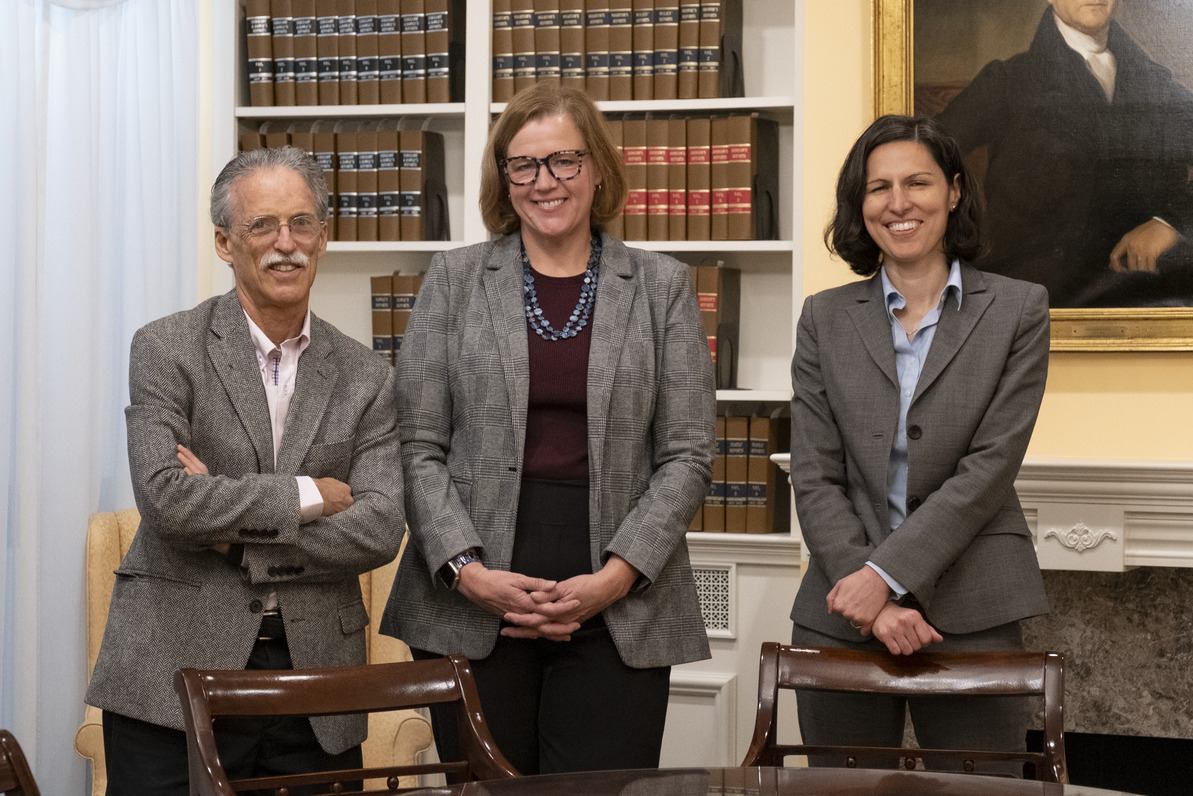
Epstein (left) and Levy began developing the Federal Appellate Litigation Clinic in 2018. The clinic has handled at least two appeals each year since 2020. (Photography by Joseph V. Labolito)
Jay Wright was born in Trinidad and Tobago in 1982. When he was 11 years old, he fled to the United States, where he’s lived ever since. He is an Air Force veteran and served on tours in Qatar and Afghanistan before he was honorably discharged in 2008.
In October of that year, Wright was involved in an altercation and was arrested and charged with armed robbery. He served his full 10-year sentence, but upon being released in 2019, Wright was detained by ICE.
Wright is considered a lawful permanent resident (LPR) due to the way he entered the country. Because of his immigration status, he was under the watchful eye of immigration authorities, including ICE.
“If you are an LPR you are not an American citizen,” Levy said. “Being convicted of a crime violates your LPR status and would subject you to an order of deportation, and that is exactly what happened in Jay’s case.”
Wright filed for asylum, but lower immigration courts upheld the order of deportation to send him back to Trinidad and Tobago. When Wright appealed the lower courts’ decisions, his case was sent to the Third Circuit, which is when the clinic got involved.
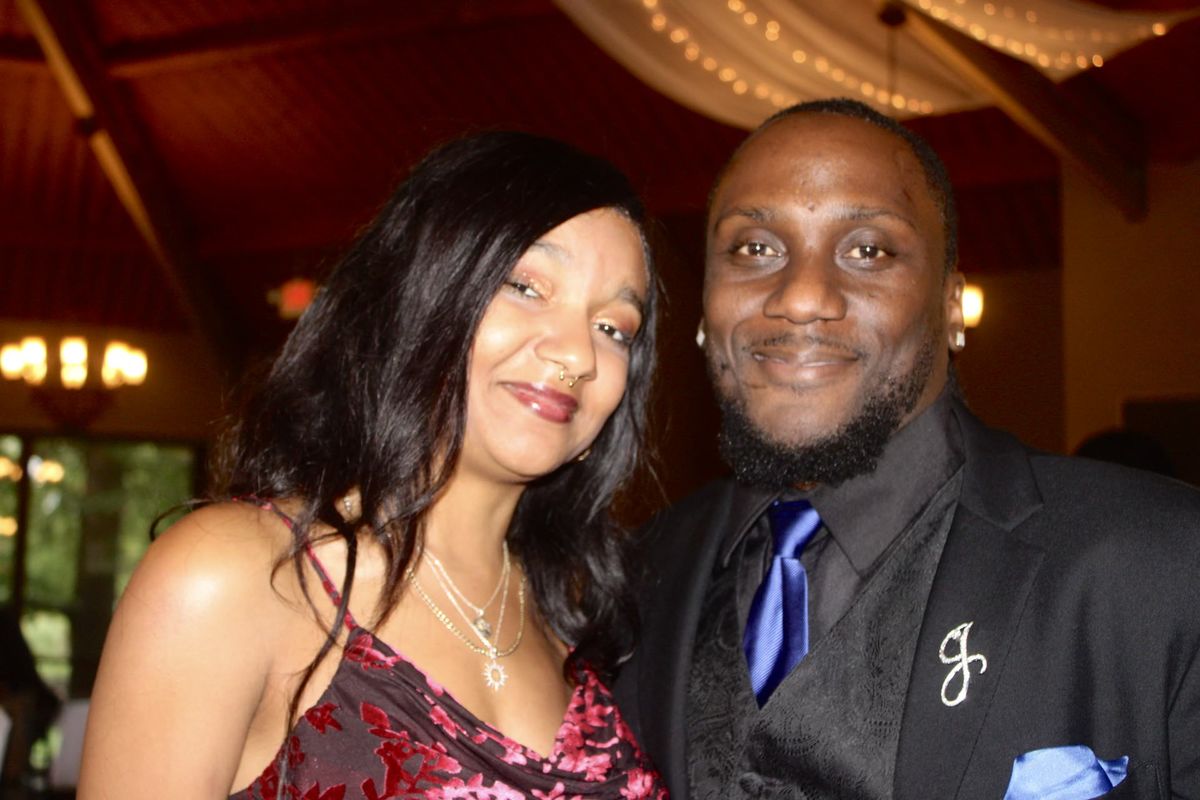
Wright and his daughter Le’Zhaé. They live in Long Island, where Wright attends Suffolk County Community College. (Photography courtesy of Jay Wright)
At the start of each school year, the Third Circuit provides Levy and Rickabaugh with a list of cases for the clinic to consider. They gravitated toward Wright’s case in part due to his history as a veteran.
“This was someone who had served our country overseas, who had been honorably discharged, and I felt like that was a compelling fact in favor of providing representation,” Levy said. “But Jessica and I also reviewed and assessed the merits of his case before taking it.”
In addition to Shah, the clinic team in 2020–2021 included Sarah Kim, Araesia King and Lauren Doig. In working on Wright’s case, the students were tasked with looking through the lower court records for errors, which could allow Wright’s case to be reheard. They worked closely with Wright throughout this process, and over the course of the school year they organized their findings in a pair of what are called appellate briefs—documents that spell out how a lower court made an error in a case.
That process began in September 2020 when the clinic team contacted Wright while he was detained in Bergen County Jail in Hackensack, New Jersey.
“My initial impression of Jay was that he was an incredible advocate for himself before he had anyone fighting for him,” said Kim, who now works as a supervising attorney at Community Legal Services in Philadelphia. “He had done a really thorough job of poring through records and establishing his own research, and I felt like we had a lot to work with.”
Despite the foundational work Wright had done, he and the clinic team understood the challenges of navigating immigration laws. Successfully appealing the order of deportation would be a long shot.
“I had some prior immigration practice experience, so I knew how unwieldy, unforgiving and uncompassionate of a system it is,” Kim said. “Even with how great of a job Jay did on his own and even with the backing of the clinic, I still felt an overwhelming fear that the facts wouldn’t be strong enough to get him the relief that he needed.”
But over the course of the school year, the clinic team spent countless hours working on Wright’s case and building strong appellate briefs. In doing so they made numerous major breakthroughs, and they gained crucial law practice experience.
“We were a team that had never practiced on our own before, but here we are writing an appellate brief for the first time and having really different opinions about it,” Kim said. “The challenging thing about the practice of law is you are trained to debate and fight over whatever you believe in, even within your own team. But working through conflict and figuring out how to be productive and collaborative when we disagreed was really valuable work experience.”
“One of the most valuable aspects of the clinic was learning to have confidence in yourself and learning that you can be right,” said Shah, who currently works as a clerk in the Third Circuit Court of Appeals. “In practice you quickly learn that reaching correct conclusions involves exercising discretion on some level, so you must be confident in the process you’re using to reach your conclusion. Being able to gain that confidence early in your career, rather than having to wait until you’re 20 years in, was a huge benefit of being involved in the clinic.”
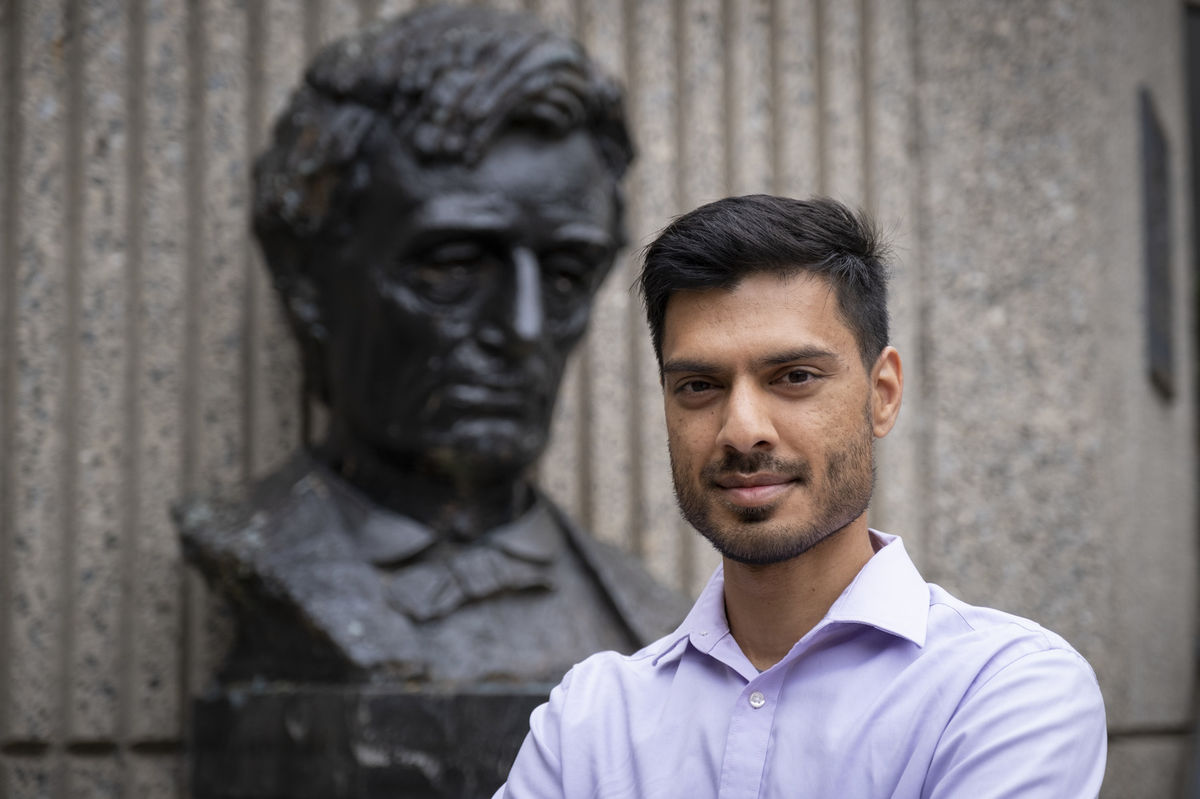
Shah works as a clerk in the Third Circuit Court of Appeals in Center City Philadelphia. (Photography by Joseph V. Labolito)
Arguments in Wright’s case were scheduled for May 26, 2021. During oral arguments, a student from the clinic team, in this case Shah, and a lawyer from the Department of Justice present their arguments to a panel of Third Circuit judges. The panel can interrupt at any time to ask questions about the arguments and the governing law.
Shah and the team only had a few weeks between the last day of Beasley classes and the day of arguments to finalize their case. Part of Shah’s preparation involved three moots, or mock trials, where he participated in simulated arguments with Beasley faculty members. Just five days before arguments, Shah, Kim and the rest of the team graduated. As exciting as the day was, they found themselves consumed by feelings of nervousness about the Wright case. Those feelings culminated on the morning of May 26.
“That was the day I decided I can’t drink coffee anymore,” Shah laughed. “I felt great at 7 a.m. Then I drank my morning coffee and suddenly I’m flooded with anxiety. I’m so anxious I can’t even hear myself think.”
COVID-19 protocols at the time meant that arguments in Wright’s case were conducted on Zoom.
“Sarah and the rest of the team were tuning in to the livestream,” Shah said. “And we were all texting of course too. They were sending me messages like oh, talk about this, talk about that. But frankly I was either so in the zone or freaked out that I couldn’t internalize that.”
“And then Neilay starts talking, and I’m hanging on every word—every single thing that the panel is asking, everything that the government is saying,” Kim said. “I was losing my cool, but I remember thinking that Neilay was doing such a great job.”
Arguments lasted about 45 minutes in Wright’s case. When they concluded, Levy called Wright and played him the recording.
“It sounded like the guy from the Department of Justice had a wrinkled shirt and a plastic bag filled with paperwork. He sounded unsure and unprepared,” Wright said. “Neilay sounded like he was seven feet tall. Neilay came, not with his A game, but with his A plus game.”
It would take almost five months before the Third Circuit judges reached their decision. This was an invigorating time for the clinic students, who were taking the bar exam, interviewing for jobs and even beginning their law careers.
Then on Oct. 5, the team received the news that they had won their appeal of Wright’s case.
“I found out while I was in a meeting with my supervisor at Community Legal Services,” Kim said. “I just started bawling. It wasn’t even that I was happy or excited, I was just relieved that Jay wasn’t being sent back to this place where he has no family or resources.”
For Shah, the news came within weeks of getting married and learning he had passed the bar.
“It was great to pass the bar exam and become a lawyer, but doing the work of a lawyer and winning for our client who was in this really unfair situation, that’s what really made me feel like everything was worth it,” Shah said.
The successful appeal didn’t outright free Wright. Levy describes the appeal as the first domino to fall leading to Wright’s release. In the following months, Levy helped Wright obtain pro bono counsel to represent him as his case was reheard in a lower immigration court. The Department of Justice eventually dropped their proceedings against Wright, and he was finally released from detention—a free man.
“Everyone who worked under Mary was so involved, so prepared. They were my dream team,” said Wright, who now lives in Long Island with his daughter, Le’Zhaé. “If it wasn’t for them, I wouldn’t be where I am now, at home living with my daughter.”
Wright is a full-time student at Suffolk County Community College. He plans to pursue a career as a radiology technician upon completing his bachelor's degree.
Since it was created in 2020, Beasley’s Federal Appellate Litigation Clinic has successfully appealed five cases for its clients. That equates to a success rate of 83% in cases that have reached a definitive conclusion.
Now in its third year, the clinic has two teams actively working on two cases. One is an immigration appeal, and, just as they did in Wright’s case, clinic students are reviewing court records in hopes of getting their client’s case reheard in a lower court. This case involves a significant amount of research for the clinic students, including meticulous review of more than 1,300 pages of legal record.
The other team is handling a constitutional rights claim for an incarcerated client. The team spent three months reviewing the record and doing intensive legal research in order to develop arguments on the client's behalf. The team filed an appellate brief and hopes to argue the case in front of the Third Circuit this spring. Their goal is to obtain a reversal of the lower court’s decision so that the client can be heard on his constitutional claims.
Levy is pleased with the clinic’s results thus far, but she knows that its important work is ongoing.
“I’m proud of our accomplishments and the success we’ve had,” Levy said. “But there is still work to be done, and our exceptional students will continue to fight for justice for our clients.”
Read more
- Temple Law: Faculty from the Beasley School of Law are experts on the most relevant law topics of the day, and they’re leading a student body that is eager to use law as a tool for social and systemic change.
- Practicing law in and out of the classroom: Thanks to a variety of clinic and practicum offerings, Beasley students enjoy real, hands-on instruction and practice that prepares them to make an impact in their law careers.
- Become an Owl: Learn more about applying for one of our undergraduate, graduate or professional programs.
